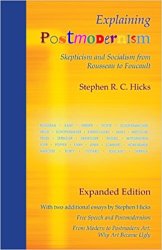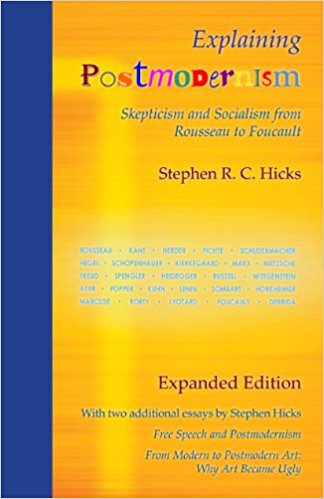“Why is it that skeptical and relativistic arguments have the cultural power that they now do? Why do they have that power in the humanities but not in the sciences? Why have themes of exhaustion, nihilism, and cynicism come to have the cultural dominance they do? And how can those intellectual themes coexist with a broader culture that is richer, freer, and more vigorous than any culture at any other point in history? Why is it that the leading postmodern thinkers are Left in their politics—-in most cases, far Left? And why is it that that prominent segment of the Left—-the same Left that traditionally defended its positions on the modernist grounds of reason, science, fairness for all, and optimism-—is now voicing themes of anti-reason, anti-science, all’s-fair-in-love-and-war, and cynicism?” (p. 30)
 For my answer to these questions, see Explaining Postmodernism: Skepticism from Rousseau to Foucault.
For my answer to these questions, see Explaining Postmodernism: Skepticism from Rousseau to Foucault.
Information about other editions and translations is available at this dedicated page.

What about the puzzling lack of prominence of postmodernism in France? It has had an influence but nowhere near as important as can be seen in North America. France still fiercely insists on human universals and went as far as banishing the concept of race from public discourse and statistics. The lack of gender studies and other departments is striking. The subjective aspects of postmodern thought do not seem to have as much power as they should. I would love to hear your thoughts on why that is.
I just finished reading your book and I noticed what I think might be a logical problem.
Your thesis is that postmodernism is a result of the failure of socialism, namely the failure of the Soviet Union to live up to the promises of socialism. In this I agree.
But in the first chapter you lay out a schematic between ‘modernism’ and ‘postmodernism’, where the defining economic mode of modernism is capitalism, and the defining economic mode of postmodernism is socialism. However, how is it possible that postmodernism’s economic worldview is socialism if it was the failure of socialism that drove postmodernism to be created in the first place? Or in other words, if socialism already came into existence and also failed prior to postmodernism, and Liberal capitalism is the economic ideology of modernism, what period does socialism belong to?
What’s the deal with this?
Thanks for the thoughtful question, John. I’ll take it up in a post, soon.